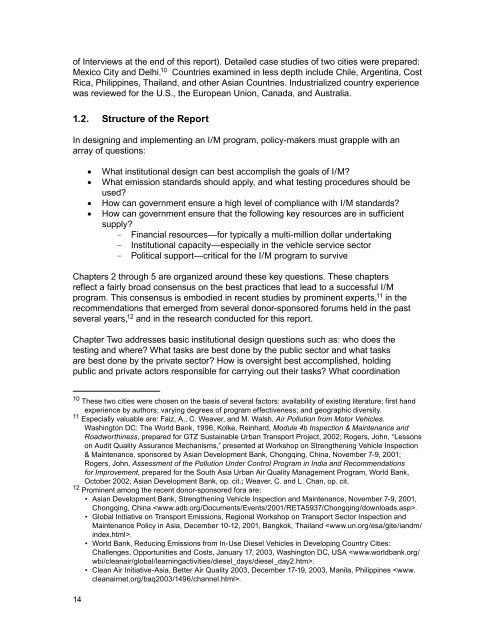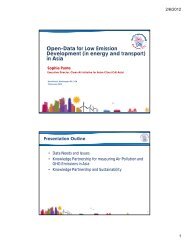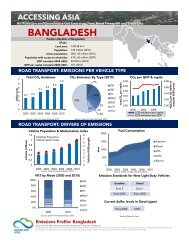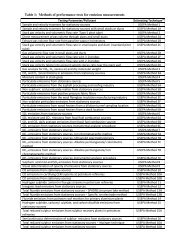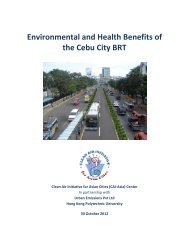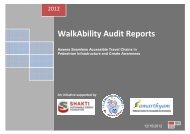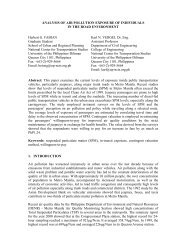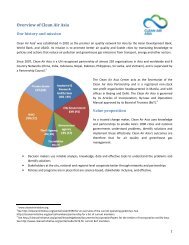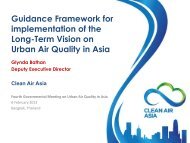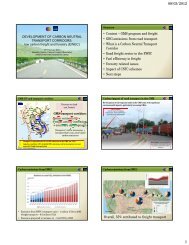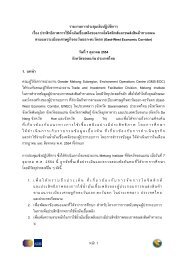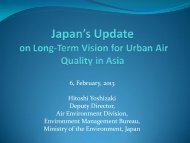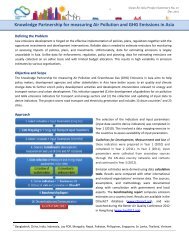International Experience and Best Practices - Clean Air Initiative
International Experience and Best Practices - Clean Air Initiative
International Experience and Best Practices - Clean Air Initiative
You also want an ePaper? Increase the reach of your titles
YUMPU automatically turns print PDFs into web optimized ePapers that Google loves.
of Interviews at the end of this report). Detailed case studies of two cities were prepared:<br />
Mexico City <strong>and</strong> Delhi. 10 Countries examined in less depth include Chile, Argentina, Cost<br />
Rica, Philippines, Thail<strong>and</strong>, <strong>and</strong> other Asian Countries. Industrialized country experience<br />
was reviewed for the U.S., the European Union, Canada, <strong>and</strong> Australia.<br />
1.2. Structure of the Report<br />
In designing <strong>and</strong> implementing an I/M program, policy-makers must grapple with an<br />
array of questions:<br />
14<br />
• What institutional design can best accomplish the goals of I/M?<br />
• What emission st<strong>and</strong>ards should apply, <strong>and</strong> what testing procedures should be<br />
used?<br />
• How can government ensure a high level of compliance with I/M st<strong>and</strong>ards?<br />
• How can government ensure that the following key resources are in sufficient<br />
supply?<br />
– Financial resources—for typically a multi-million dollar undertaking<br />
– Institutional capacity—especially in the vehicle service sector<br />
– Political support—critical for the I/M program to survive<br />
Chapters 2 through 5 are organized around these key questions. These chapters<br />
reflect a fairly broad consensus on the best practices that lead to a successful I/M<br />
program. This consensus is embodied in recent studies by prominent experts, 11 in the<br />
recommendations that emerged from several donor-sponsored forums held in the past<br />
several years, 12 <strong>and</strong> in the research conducted for this report.<br />
Chapter Two addresses basic institutional design questions such as: who does the<br />
testing <strong>and</strong> where? What tasks are best done by the public sector <strong>and</strong> what tasks<br />
are best done by the private sector? How is oversight best accomplished, holding<br />
public <strong>and</strong> private actors responsible for carrying out their tasks? What coordination<br />
10 These two cities were chosen on the basis of several factors: availability of existing literature; first h<strong>and</strong><br />
experience by authors; varying degrees of program effectiveness; <strong>and</strong> geographic diversity.<br />
11 Especially valuable are: Faiz, A., C. Weaver, <strong>and</strong> M. Walsh, <strong>Air</strong> Pollution from Motor Vehicles.<br />
Washington DC: The World Bank, 1996; Kolke, Reinhard, Module 4b Inspection & Maintenance <strong>and</strong><br />
Roadworthiness, prepared for GTZ Sustainable Urban Transport Project, 2002; Rogers, John, “Lessons<br />
on Audit Quality Assurance Mechanisms,” presented at Workshop on Strengthening Vehicle Inspection<br />
& Maintenance, sponsored by Asian Development Bank, Chongqing, China, November 7-9, 2001;<br />
Rogers, John, Assessment of the Pollution Under Control Program in India <strong>and</strong> Recommendations<br />
for Improvement, prepared for the South Asia Urban <strong>Air</strong> Quality Management Program, World Bank,<br />
October 2002; Asian Development Bank, op. cit.; Weaver, C. <strong>and</strong> L. Chan, op. cit.<br />
12 Prominent among the recent donor-sponsored fora are:<br />
• Asian Development Bank, Strengthening Vehicle Inspection <strong>and</strong> Maintenance, November 7-9, 2001,<br />
Chongqing, China .<br />
• Global <strong>Initiative</strong> on Transport Emissions, Regional Workshop on Transport Sector Inspection <strong>and</strong><br />
Maintenance Policy in Asia, December 10-12, 2001, Bangkok, Thail<strong>and</strong> .<br />
• World Bank, Reducing Emissions from In-Use Diesel Vehicles in Developing Country Cities:<br />
Challenges, Opportunities <strong>and</strong> Costs, January 17, 2003, Washington DC, USA .<br />
• <strong>Clean</strong> <strong>Air</strong> <strong>Initiative</strong>-Asia, Better <strong>Air</strong> Quality 2003, December 17-19, 2003, Manila, Philippines .


